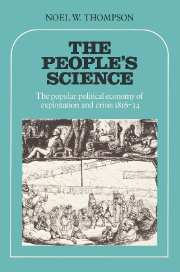Book contents
- Frontmatter
- Contents
- Preface
- Introduction
- 1 Changing attitudes to political economy in the working-class press 1816–34
- 2 The need for a working-class political economy
- 3 Charles Hall and Robert Owen: anti-capitalist and socialist political economy before the Ricardian socialists
- 4 Ricardian socialists/Smithian socialists: what's in a name?
- 5 The theory of labour exploitation and the working-class press 1816–30
- 6 The theory of labour exploitation and the working-class press 1830–34
- 7 Early socialist political economy and the theory of capitalist crisis
- 8 The popular political economy of crisis 1816-34
- Conclusion
- Bibliography
- Index
6 - The theory of labour exploitation and the working-class press 1830–34
Published online by Cambridge University Press: 14 January 2010
- Frontmatter
- Contents
- Preface
- Introduction
- 1 Changing attitudes to political economy in the working-class press 1816–34
- 2 The need for a working-class political economy
- 3 Charles Hall and Robert Owen: anti-capitalist and socialist political economy before the Ricardian socialists
- 4 Ricardian socialists/Smithian socialists: what's in a name?
- 5 The theory of labour exploitation and the working-class press 1816–30
- 6 The theory of labour exploitation and the working-class press 1830–34
- 7 Early socialist political economy and the theory of capitalist crisis
- 8 The popular political economy of crisis 1816-34
- Conclusion
- Bibliography
- Index
Summary
It can be seen, therefore, that the working-class press of the early 1830s did not initiate the popularisation of the notion that labour was, in some manner, the source of economic value. Nor can any of the contributors to working-class papers in this period be said to have clarified the exact nature of the causal relationship which existed between labour and the value of commodities. Certainly there is no theoretical advance in the discussion of this matter, upon what had already been written in the co-operative press of the late 1820s. Thus the relation between labour and value was still expressed in terms characterised by the generality of what they denied rather than the precision of what they asserted: ‘labour and only labour is property … what is land? … so much dirt and dust … without labour what is everything else, valueless without labour’; ‘labour is the only true wealth, nothing is produced without it’; ‘There is no species of wealth or in other words no article of real and substantial value that is not more or less the product of labour’; ‘of all species of property, LABOUR is infinitely the most valuable, in as much as it is the prime producer’. In many respects these assertions are not markedly different from many to be found in the early radical press.
- Type
- Chapter
- Information
- The People's ScienceThe Popular Political Economy of Exploitation and Crisis 1816–34, pp. 136 - 157Publisher: Cambridge University PressPrint publication year: 1985



